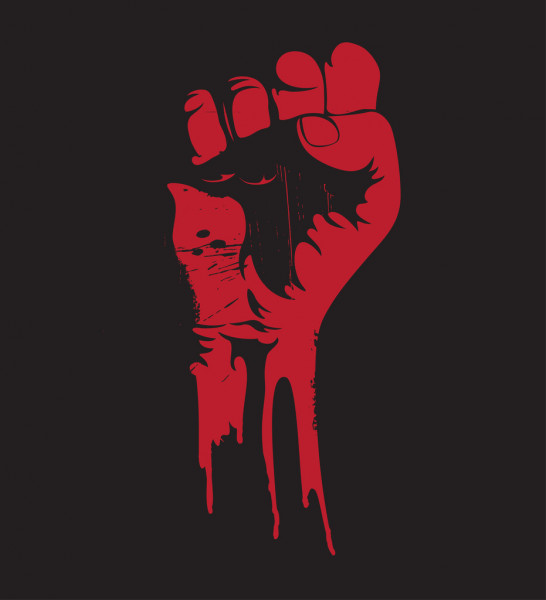PODCAST:
TRANSCRIPT:
Whenever any kind of rebellion or protest occurs, it’s always pertinent to ask what the individuals in question are rebelling against, what do they want, and why do they want it. Rebellion without a cause is an exercise in futility. The great teacher of this was the French existentialist Albert Camus, whose life was cut short in 1960 at the age of 46. Several years prior to this he published a book titled L’Homme Revolté which was translated into English as The Rebel: An Essay on Man in Revolt. Today, when catchphrases like “transformational politics,” “speaking truth to power,” and “peaceful protest” are making the rounds, it may profit us to think back on Camus’ analysis of rebellion. History is full of great rebels, both real and mythical. What made them great?
Camus’ hypothesis was that rebellion takes us to the heart of the human condition in a universe that he regarded as absurd. For untold centuries, humanity has believed that our place in the universe is known, that the meaning of our existence is a settled fact, and that the creator of the world has a paternal interest in the well being of all of us. Nietzsche thought that we can no longer believe these things, and with this Camus was in full agreement. It falls to each of us as an individual to impose on life whatever meaning it will have, for in itself it has no meaning at all. Meaning is not a discovery but an invention, and I am the only one who can decide what it will consist in. If I fail to impose a meaning on my life, it will have none at all. This represents no small change in the human condition, the change from regarding meaning as a given to a choice and an invention. It changes everything. It means that I am completely responsible for my life. I am an agent, or I must become one, and in order to become one I must begin by facing up to the basic condition of my life, which Camus famously summed up in a word: absurdity. In the face of the absurdity of the world, we can submit or we can rebel, and we ought to rebel. We refuse to let absurdity have the last word.
As he expressed it, “Man is the only creature who refuses to be what he is.” What we are, or merely are, is absurd: a biological organism with a limited time on earth, while the rebel is the one who overcomes their condition. Camus put it this way: “What is a rebel? A man who says no, but whose refusal does not imply a renunciation. He is also a man who says yes, from the moment he makes his first gesture of rebellion. A slave who has taken orders all his life suddenly decides that he cannot obey some new command. What does he mean by saying ‘no’? he means, for example, that ‘this has been going on too long,’ ‘up to this point yes, beyond it no,’ ‘you are going too far,’ or, again, ‘there is a limit beyond which you shall not go.’ In other words, his no affirms the existence of a borderline.” In the decision to rebel one becomes aware of the limits of what one will tolerate, and as one approaches that limit the sense of oneself as an agent comes into its own. One becomes an individual precisely in refusing to submit to conditions that oppress one. The rebel asserts oneself in the face of the absurd or the oppressive and so becomes oneself. Such rebellion is a necessary condition of a self-realization that is always a difficult task. It requires far more than merely “being myself,” as we say, but a refusal to go along unthinkingly with what everyone is doing and how everyone is living. Who is this self that I must become? Is it some thing or other that is lurking in my interiors? Camus’ answer is no, there is no self at all until I rebel or push back against the very forces and conditions that created me, and this begins with some creative negation.
It’s important to understand that in the process that Camus was describing, while the attainment of autonomy or self-realization can appear as essentially a negative act, as if all you need to do is say no often enough and some kind of liberation will result from it, this is not the case. Your rebellion must be creative: it must lead to a choice to be this or that, to create something, to do something that is genuinely your own. Your rebellion must also be a social undertaking, such that when I rebel I’m rebelling for the sake not of my personal freedom alone but of the freedom of all. Otherwise my rebellion is an empty gesture, an act of self-indulgence. Above all, for my rebellion to have meaning, it must be a prelude to creativity or have some positive content. For Camus, the real significance of protest lies not in what we are opposing but in what we’re affirming, and when it lacks some positive content it’s an empty gesture. Rebellion is a means of affirming something; it is a call to order, as the philosopher calls an absurd universe into some semblance of order and reason. They don’t so much describe a pre-existing order in the world as create and impose order on a world that lacks it, as the political philosopher tries—maybe in vain—to impose some sense of justice on the world or the existential thinker tries to impose meaning on an existence that otherwise lacks it.
The theme of rebellion is omnipresent in the Western tradition, from the Book of Genesis and Greek mythology through until modern times. The examples are many, and what they have in common again isn’t nihilism but a protest against everything in human existence that is meaningless, unjust, irrational, or absurd. The great political rebellions that were the French and American Revolutions originated as protests, but they did more than merely throw off their oppressors but sought to affirm some new set of values. A meaningful rebellion doesn’t simply reproduce the conditions one is protesting against. The failed revolution is not only the one that fails to remove its oppressor but one that succeeds only to usher in a new oppressor, as we have seen so many times before. The French Revolution ushered in the reign of terror and Napoleon; the Iranian Revolution cleared the way for authoritarianism in a new and worse form than the old, and this is not the kind of rebellion for which Camus was calling. The point of an authentic rebellion isn’t to replace one false absolute with another but to live in a world that is without absolutes. We must give up the absolute and replace it with a sense of the contingency and the difficulty of our existence. The collapse of the absolute and the recognition of the absurd changes everything and confronts me with a question: to live or not to live, and also the meaning of that choice where the options are essentially two: revolt or resignation, “awakening” or suicide. Our imperative, as he put it, is to “live in the desert.” It is an arduous task to make oneself at home in the kind of world that Camus was describing, but it can be achieved through a combination of rebellion and consciousness, where what we are conscious of is the absurd itself. We cannot overcome the absurdity of the world, but we can become aware of it—look it in the eye and without resignation; “crushing truths perish from being acknowledged.” Much of Camus’ work was intended to inspire his readers, not to make them resigned to a pessimistic view of life but to ignite some passion in his readers and to inspire them to revolt. Suicide or resignation does not follow upon the consciousness of absurdity. On the contrary; in his words, “That revolt gives life its value.” Remember Dostoevsky’s nameless underground man: my freedom and dignity, he insisted, lie in demonstrating that I’m not a cog in the machine. Human existence itself is what Camus called the “opposition between my consciousness and the darkness in which it struggles.”
A further point Camus made concerns happiness. “Happiness and the absurd are two sons of the same earth. They are inseparable,” he writes in The Myth of Sisyphus; “One must imagine Sisyphus happy.” Camus imagined Sisyphus being fully mindful of the absurdity of his existence and it’s this awareness that saves him from the abyss. What makes him a heroic figure for Camus is his refusal to submit to his fate. He continues to roll the rock up the hill, but he is aware of his condition and this consciousness is inseparable from happiness, or so Camus believed. Exactly how rebellion, awareness, creation, and happiness are related is difficult to say, but for Camus they are something of a package deal, and in a time when protest is very much in vogue it profits us to think through the implications of this act.
 |
 |
#camus #albertcamus #rebellion #rebel #absurdity


Leave a comment